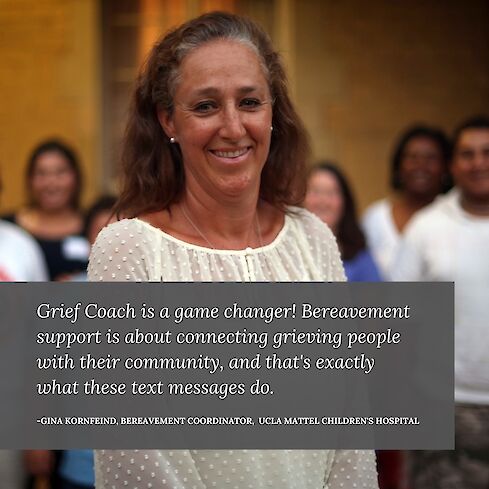Gina is the bereavement coordinator at UCLA Mattel Children's Hospital, and she is exhausted
Gina Kornfeind is the Bereavement Coordinator at UCLA Mattel Children's Hospital. She's spent 11 years supporting parents whose children receive care at her hospital, and over 30 years working in bereavement support.
Gina is passionate about her work, but COVID-19 and the surge in deaths in California, have brought her to the brink of exhaustion. "My cup feels empty a lot of the time," she says. On top of her regular work supporting grieving family members, she's hearing more and more from friends and neighbors who need support after a loved one dies. "I'm doing what I can," Gina says, "dropping brochures into mailboxes late at night, and taking people's calls in the evening, but I'm tired." Recently she's also been asked to step in and conduct memorials for hospital employees, and to then support managers who ask her for help knowing what to say and do.
Gina's story is one of far too many. On May 11th, a new McKinsey report warned that nearly a quarter of nurses in the US are considering leaving their work on the front lines. The report speaks to how increasing demands placed on healthcare workers have created both a physical strain as well as a psychological strain for those losing patients, or in some tragic cases, coworkers and loved ones. I'm sad to say that nothing in the report surprised me. I speak every day, with caregivers whose cups are as empty as Gina's: nurses, social workers, bereavement managers, clinicians and support workers who are looking for ways to keep up.

It was Gina's attempt to keep up, that led her to Grief Coach. She was searching for grief resources for a family in her neighborhood whose child had died. She knew she couldn't provide anywhere near enough support for the family and neighbors who needed help, and so decided to buy a Grief Coach subscription for her grieving neighbor. She especially liked the idea that Grief Coach would send texts to the grieving family, AND to the friends and neighbors who wanted to help. "Grief Coach saved me time and worry," Gina shared, "and improved outcomes for the family too. It connects grieving people with their community, which is exactly what needs to happen after a death."
After seeing how useful Grief Coach was for her neighbor, Gina started thinking about how great it could be at work, as well. A few years ago Gina lost a special patient - a teenager who touched her heart. She started using Grief Coach to get grief support for herself as a professional caregiver, and when she received a text with a reminder about the anniversary of the patient's death it spurred her to reach out to his Mom. The teenager's Mom responded right away with photos and gratitude, and Gina saw again how powerful simple, personal text messages can be in providing support when someone dies.
"I wish we had this for all of our patients' families, she shared."
As a bereavement professional, Gina knows that supporting family members after a death means a reduction in illness, anxiety, sleep issues, substance use and more. She also knows that this applies to professional caregivers too. Grieving is raw and painful to witness. Nurses and social workers and other care providers are called on to address suffering every day, and to witness what may be the most catastrophic and stressful event in a person's life. It's no wonder, then, that our nation's care providers are experiencing compassion fatigue and burnout, and that reports like the one from McKinsey predict an enormous amount of attrition this year.
I asked Gina what can help.
"I wish I had resources to give people," she said. "It's stressful leaving families without adequate resources and feeling as though we have to be the sole support, because then we worry about people falling through the cracks. I think that caregivers like me constantly feel that what we're doing isn't enough, and that all the responsibility for providing support sits with us. Instead we need to feel supported ourselves, and confident that we have adequate grief support resources to share."
I'm glad Grief Coach could play a role in alleviating stress for Gina, and am heartened each time I hear from a healthcare CEO who's interested in using Grief Coach to support their employees. There are other great supports out there too. Alica Forneret provides group and 1-on-1 training for HR teams who want to equip employees to navigate grief at work. Megan Devine is an author and psychotherapist who delivers clinical and corporate training programs that cover workplace grief policies. Her company, Refuge in Grief, is a great source of wisdom for companies wanting support with post-death communications such as how to talk to your c-suite, leadership teams, shareholders, and employees when loss impacts your workplace. I hope that employers will take advantage of these resources quickly, so that we can get policies and support programs in place to support the nurses and care providers McKinsey wrote about last week, and the healthcare workers I spend time with every week.
I know everyone who reads this will share my enormous gratitude to Gina and healthcare providers across the US who have been on the front lines caring for so many of us this year. I'm grateful to her for being brave enough to share her experience and hope that stories like Gina's can help healthcare providers recognize the urgent need to get policies and programs in place to support their employees when someone dies.